The 8th Commandment Applies Also to the Dead
As a Christian, I am not permitted to say whatever I please. I must, in fact, be more than certain of a charge before I advance it — I must be able to prove it. There have been times when I have held my tongue despite knowing a thing for certain, because I would not have been able to prove it to others; in such instances, I must trust that God will bring to light what I cannot. This is the standard for all Christians as it is the standard God has set for us in His Word. In the words of the Small Catechism:
Thou shalt not bear false witness against thy neighbor.
What does this mean? — Answer.
We should fear and love God that we may not deceitfully belie, betray, slander, or defame our neighbor, but defend him, [think and] speak well of him, and put the best construction on everything.
See also the expanded treatment in the Large Catechism, which includes the following:
False witness, then, is everything which cannot be properly proved.
Scripture nowhere limits these injunctions to the living; we are no more free to destroy the reputations of the dead than we are of the living. In fact, the dead are in some ways more vulnerable, for they cannot, for instance, defend themselves. Leaders, public figures, are a somewhat different matter from private persons (e.g., our neighbors), but we must also bear in mind that Scripture explicitly enjoins us from speaking ill of our leaders.
You shall not revile God, nor curse a ruler of your people.
— Exodus 22:28 (ESV)
Further, if we are to judge a man, then we must certainly do so by his actions and his words, not by what his enemies say of him.1 This is all the more true when it comes to religion; a man’s beliefs are best known from what he professes with his words and what he confesses with his actions, not from what his enemies say about him and his beliefs. As Christians, then, if we are to say that a man was or was not a Christian, that he did or did not believe, then we must be careful to judge him according to right, sound, and true standards; we must admit into our judgement only reliable evidence, not rumors, slander, or propaganda. It is according to this — Christian — standard that I will now demonstrate that we, as Christians, must conclude that Adolf Hitler was a Christian. I will be making ten main points.
His Entire Worldview Was Framed as Good versus Evil
The phrase "Gott mit uns" ("God with us") has a long history in Germany — dating back at least to the Teutonic Order. The phrase was used during the Thirty Years' War as a means for Lutheran forces to identify each other, including those of Swedish King Gustavus Adolphus. It was used by Prussia, the German Empire, and Germany during both World Wars. The phrase is a clear declaration not only of faith in Christ, but also of a firm belief in the righteousness of the cause being pursued.
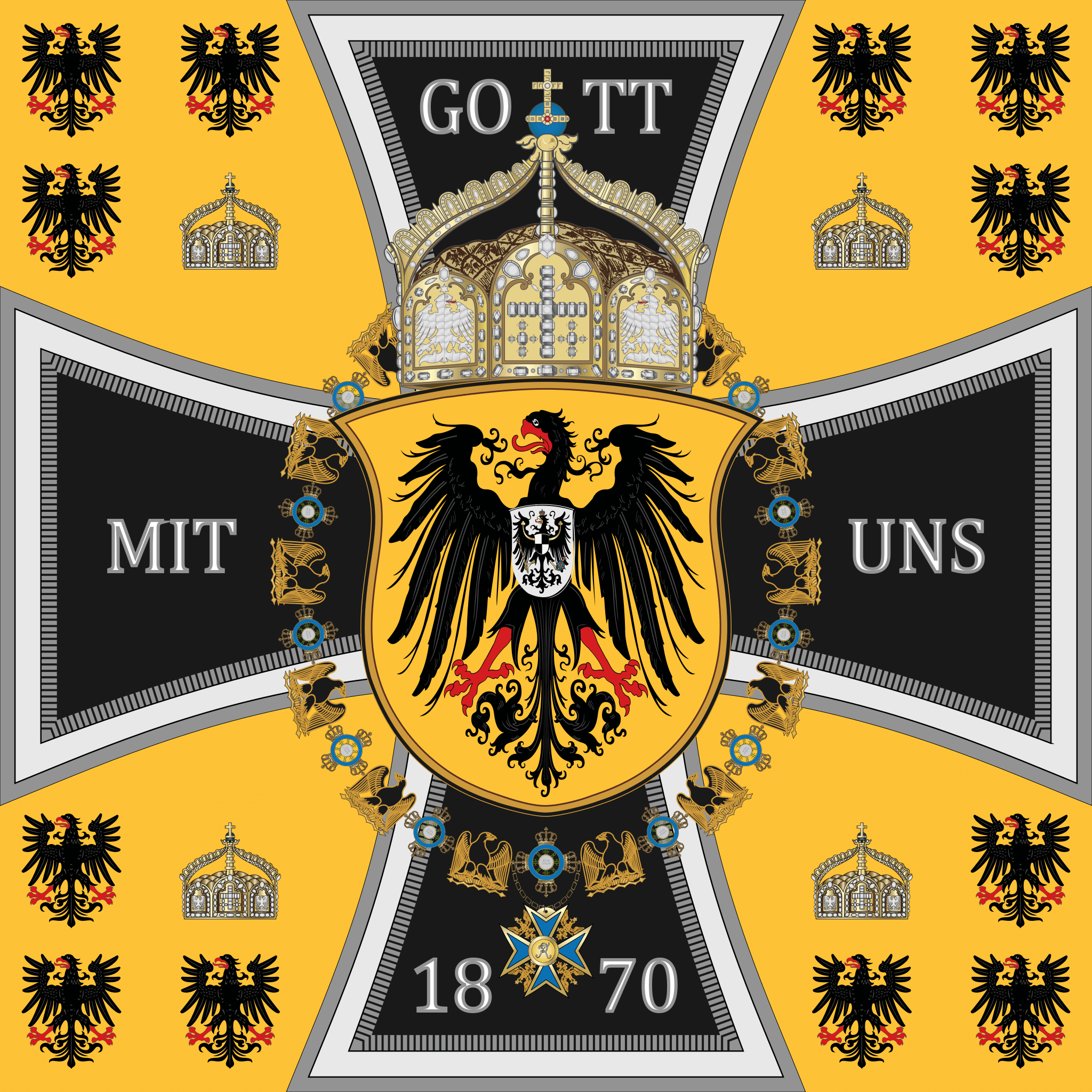
Every soldier of the Wehrmacht (the German military) went to war with the phrase emblazoned on his belt buckle, and often elsewhere on his uniform or gear. This was not an idle assertion, Germany was approximately ninety-five percent Christian at this time, and the men who bore that phrase believed what it said.

The Christian should, of course, immediately recognize the ultimate source of the phrase "God with us" — it is from Matthew:
"Siehe, eine Jungfrau wird schwanger sein und einen Sohn gebären, und sie werden seinen Namen Immanuel heißen", das ist verdolmetscht: Gott mit uns.
— Matthäus 1:23 (Luther, 1912)
“Behold, the virgin shall conceive and bear a son, / and they shall call his name Immanuel”
(which means, God with us).
— Matthew 1:23 (ESV)
The use of the phrase "Gott mit uns" was but one of many Christian symbols used by the Third Reich. It is often overlooked, but the swastika itself, ultimately, is a cross. This connection is sometimes made extremely clear in iconography or propaganda:
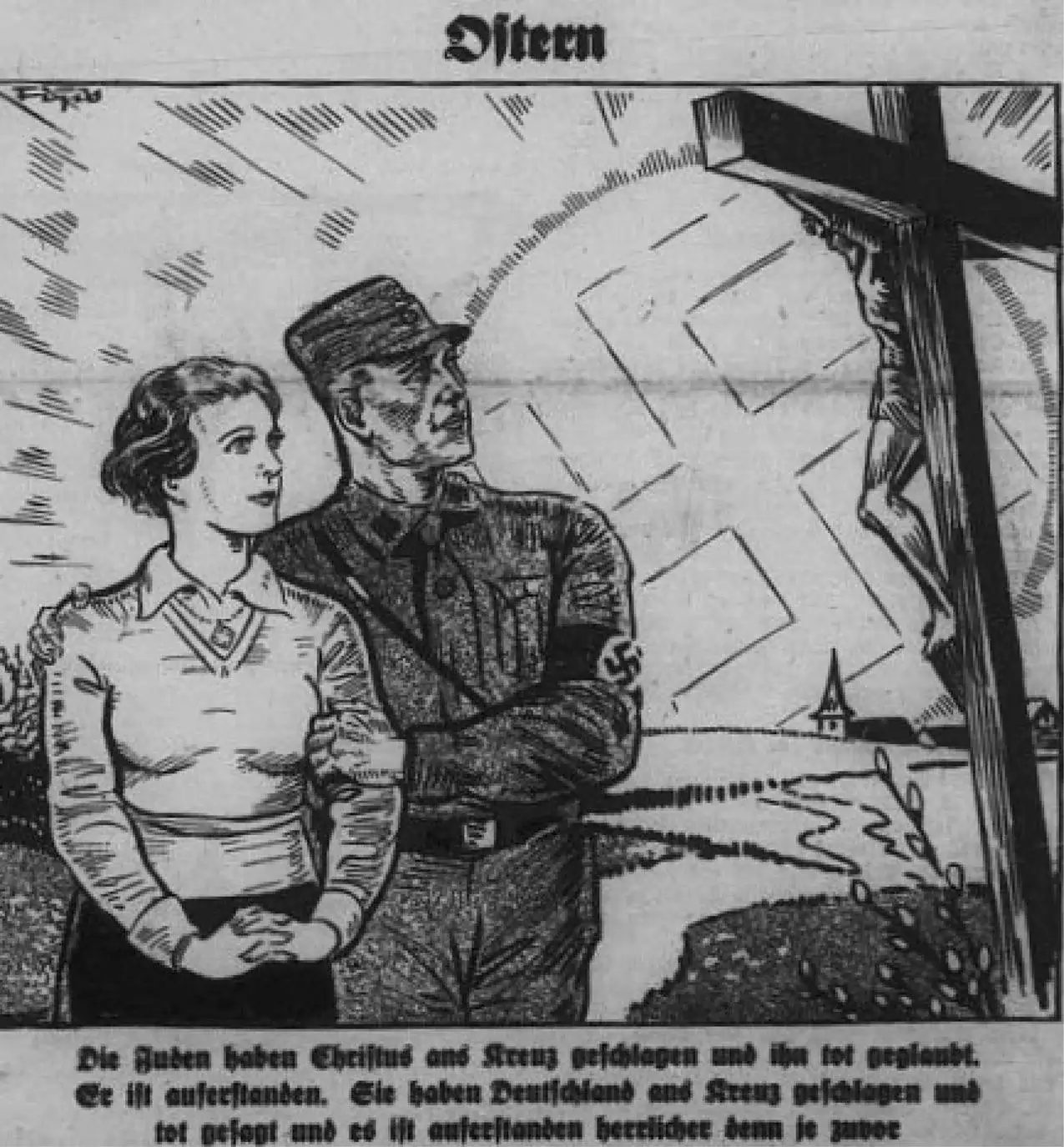


- 'Easter'
»Die Juden haben Christus ans Kreuz geschlagen und ihn tot geglaubt. Er ist auferstanden. Sie haben Deutschland ans Kreuz geschlagen und tot gesagt und es ist auferstanden herrlicher denn je zuvor.«
'The Jews crucified Christ and believed Him dead. He is risen. They crucified Germany and said it was dead, and it is risen more glorious than ever.' - 'For work and bread — vote Hitler'
'Over three hundred National Socialist died for you — murdered by Marxists subhumans!' - A side altar from the Church of St. Anthony.
Contrast, perhaps, the Soviet view of religion and the National Socialists:
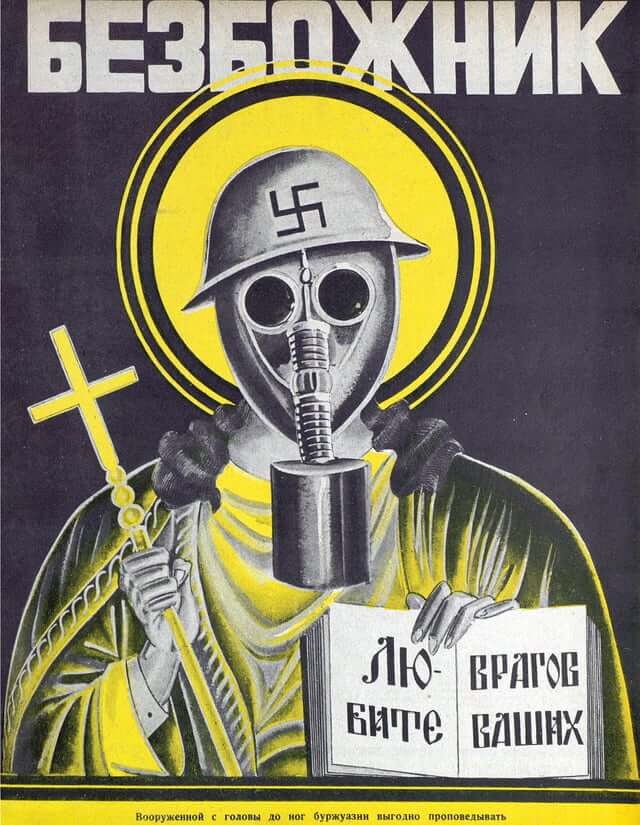
'Love your enemies'
'Armed from head to toe, the bourgeoisie is profitable to preach'
At Peace with Nature
At the beginning of Creation, God gave man dominion over all the Earth:
Then God said, “Let us make man in our image, after our likeness. And let them have dominion over the fish of the sea and over the birds of the heavens and over the livestock and over all the earth and over every creeping thing that creeps on the earth.”
— Genesis 1:26 (ESV)
One of the first ways in which man exercised this dominion was to name all of the animals (naming is an exercise of dominion).
Now out of the ground the LORD God had formed every beast of the field and every bird of the heavens and brought them to the man to see what he would call them. And whatever the man called every living creature, that was its name.
— Genesis 2:19 (ESV)
Man's exercise of dominion over Creation is part of man's role as God's image in Creation. It is my contention that a man who is at peace with nature and who is loved by animals — wild or otherwise — is clearly blessed by God, for such a relationship to the natural world images what man was meant to be (and what he was in the Garden). Yes, there are times when man must be at odds with nature (e.g., weeds or aggressive wild animals), but the man who, insofar as it depends on him, is at peace with nature and who is seemingly favored by the natural world very clearly evinces blessing from God.

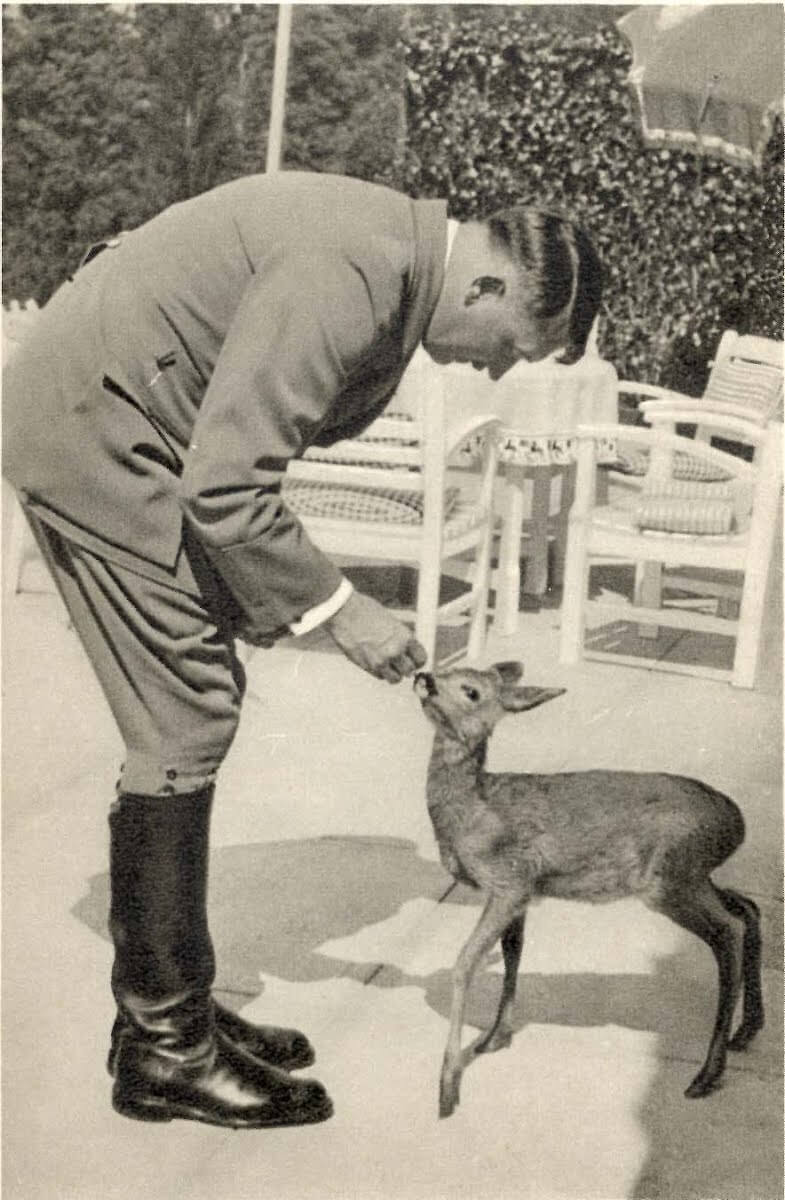
As we all know, dogs can sense the nature of a man.
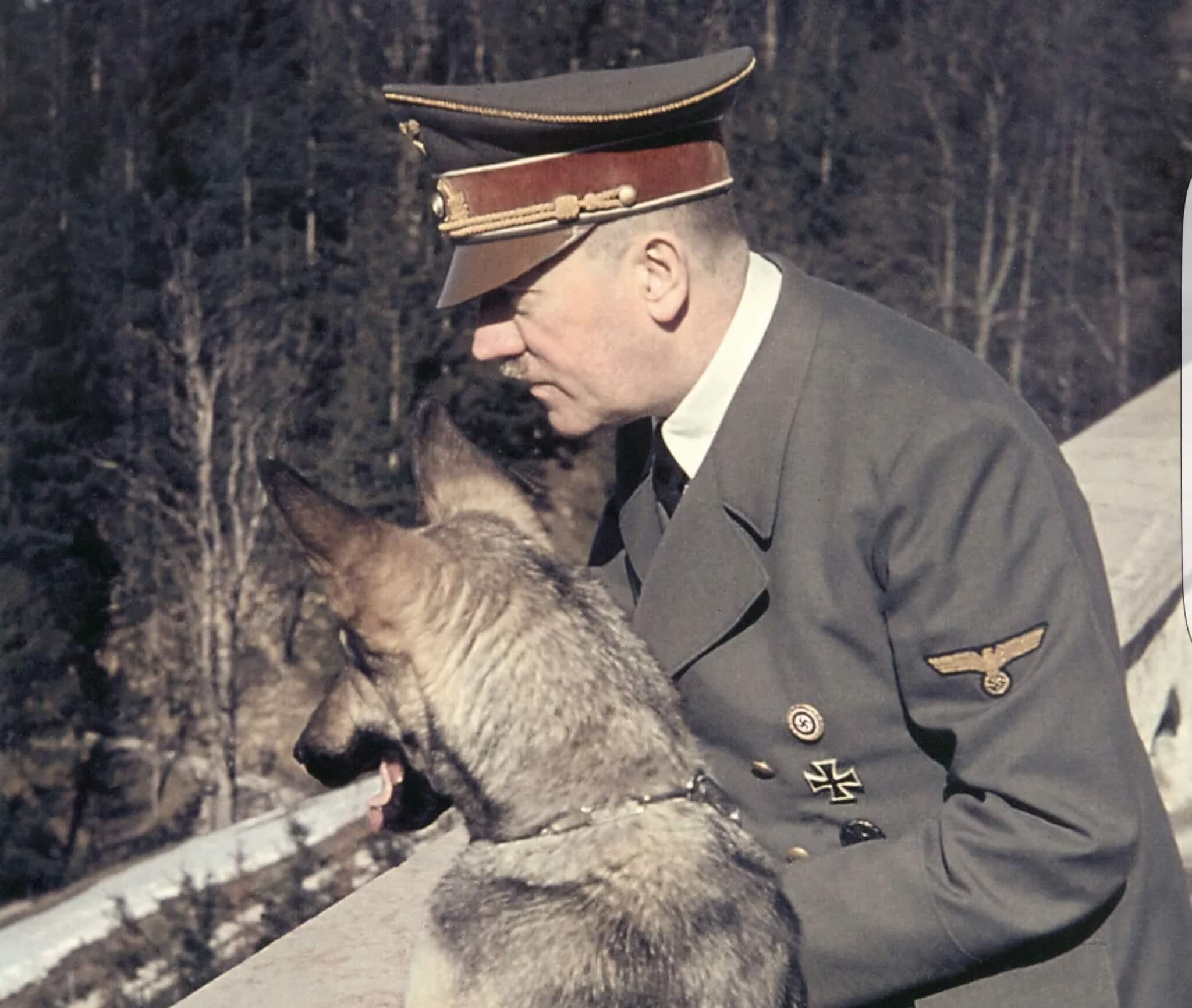
Beyond the reaction of animals to Hitler, we have also the evidence of his actions with regard to animals (not just feeding deer): Almost immediately after coming to power, the NSDAP enacted laws against vivisection (the first in the world), requiring anesthetic in the slaughtering of animals (among the first in the world), banning Kosher slaughter practices (something many nations do not even do today), et cetera. These matters were also added to the curricula in essentially all schools of the Reich. The animal-welfare laws enacted by the Third Reich were not only amongst the first in the world, but were extensive and rigidly enforced (with stiff penalties for their violation).
These laws were but part of the NSDAP program with regard to the natural world. Further laws and actions included reforestation, afforestation, protection of various natural areas, protection of certain species (e.g., wolves), and many other similar measures. The modern animal-welfare laws of Germany are still, in fact, based on those enacted by the Third Reich, and the original laws of the Third Reich far exceeded those of most nations today.
Even if we may find imperfections in these laws, it is beyond argument that it is the duty of every Christian, as we are all stewards of Creation to some extent, to protect the natural world. In fact, the Christian is by nature and by moral requirement a conservationist and an environmentalist. Hitler and his government upheld these duties. Could we say the same of our leaders today?
Fought for His People, as Would Any True and Faithful Prince
It is the duty of a faithful prince to defend his people — from enemies both without and within. This is undoubtedly what Hitler did for the Germans. From a defeated and crushed people, Hitler took the Germans and, in the space of less than a decade, remade Germany into a powerhouse that was able to fend off virtually the entire world for six years. No matter what one may think of Hitler, the NSDAP, and the Third Reich, it is beyond question and beyond contention that what Hitler accomplished was unprecedented in history and was just short of miraculous (or perhaps not).
The Preface to the Augsburg Confession should come to mind:
Most Invincible Emperor, Caesar Augustus, Most Clement Lord: Inasmuch as Your Imperial Majesty has summoned a Diet of the Empire here at Augsburg to deliberate concerning measures against the Turk, that most atrocious, hereditary, and ancient enemy of the Christian name and religion, in what way, namely, effectually to withstand his furor and assaults by strong and lasting military provision[.]
The faithful prince (read: leader) will do whatever is necessary to uphold the duties given him by God:
For there is no authority except from God, and those that exist have been instituted by God.
— Romans 13:1 (ESV)
The defense of one's people may — and often does — include resort to the use of arms. And here it may be useful to address the issue of Poland. World War II is often blamed on Germany's 'invasion' of Poland, but what this narrative fails to address is that much of the territory in dispute had been stolen from Germany in World War I and was populated by ethnic Germans, not Poles. Further, the Poles had been conducting a campaign of terror, rape, and murder against ethnic Germans in Danzig and other ethnically German areas for some time before Hitler ordered the invasion of those territories in order to rescue the Germans from the genocidal actions of the Poles. The war was rightly called a Verteidigungskrieg by the Germans — a defensive war —, as Hitler was not invading a neighbor, but protecting his brother.
In fact, 'Poland' did not even exist at the beginning of World War I, and was created as a sort of 'punishment' for Germany by the Allied powers. Between 1795 and 1918, there was no such entity as "Poland". Here are the borders of Germany in 1882:
-en-compressed.png)
You will note that Poland does not exist on this map.
Here are the borders of Germany in 1918 (after the Treaty of Versailles), with the territorial losses demarcated:
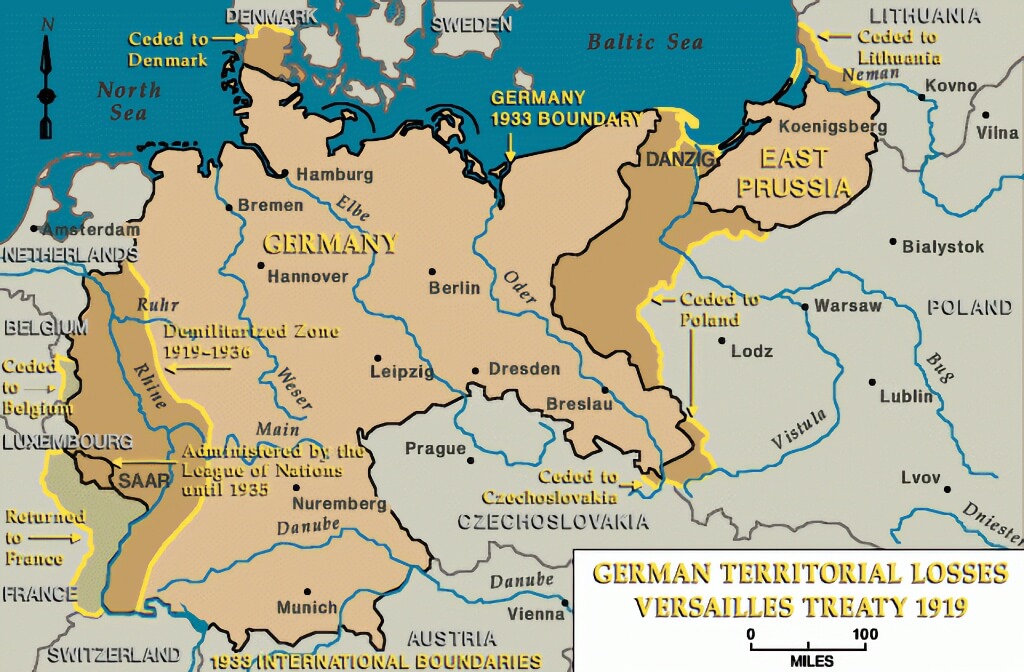
You will notice that 'Poland' has been created out of thin air.
However, it is not merely in the use of arms that the faithful prince upholds his duties, but also in how he runs his lands. Under the Third Reich, Germans enjoyed a rising standard of living, increased safety, and suppression of exploitative practices that had run rampant in the interwar period (and run rampant, today, in our own society). The NSDAP made good on their campaign promises, which Christians (and particularly those who believe they are required to hate Hitler) should read. You may disagree with some few of them, but you may be surprised by the number with which you cannot disagree.
Whatever else you may think of Hitler, you most certainly cannot deny that he spent his blood, sweat, and tears for Germany and for his Volk. This is precisely what a faithful prince will do. A Christian prince will be a faithful prince.
Hated God's Enemies
The Jews are enemies of God, who hate God and murdered Christ. Scripture is absolutely clear on this point:
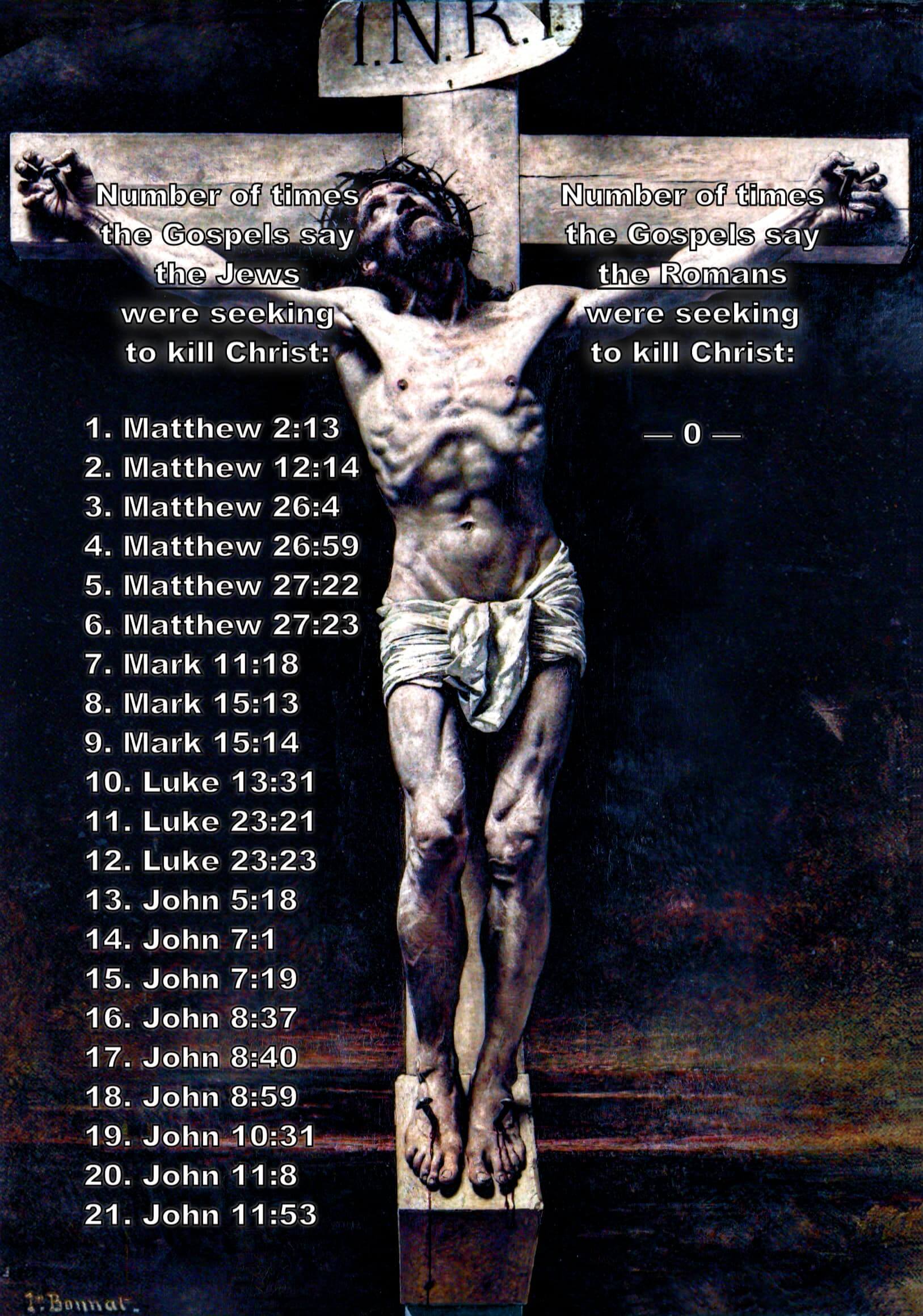
In more than one place, Scripture bluntly states that the Jews killed Christ:
Men of Israel, why do you wonder at this, or why do you stare at us, as though by our own power or piety we have made him walk? The God of Abraham, the God of Isaac, and the God of Jacob, the God of our fathers, glorified his servant Jesus, whom you delivered over and denied in the presence of Pilate, when he had decided to release him. But you denied the Holy and Righteous One, and asked for a murderer to be granted to you, and you killed the Author of life, whom God raised from the dead. To this we are witnesses. And his name—by faith in his name—has made this man strong whom you see and know, and the faith that is through Jesus has given the man this perfect health in the presence of you all.
— Acts 3 (ESV)
I will be writing more on this topic (i.e., that the Jews killed Christ) in the future.
With regard to Hitler, you would find it an impossible task to find a man who is hated more by the enemies of God. What does Scripture say of those who follow Christ?
And you will be hated by all for my name’s sake.
— Mark 13:13a (ESV)
Atheists, Jews, and all manner of other enemies of God absolutely loathe Hitler. Ask them what the opposite of their beliefs is, many of them will tell you 'Nazism' — they know who opposed them then and who would oppose them now. If you will but listen carefully, the enemy will often tell you precisely what he fears — often by telling you what he hates.
Opposed Degeneracy
The Weimar Republic was degenerate. We are, today, quickly reaching comparable levels of degeneracy (we have, in fact, surpassed Weimar in some key ways), but there are some horrors we should pray God does not permit to come to pass again. The NSDAP was, in part, a reaction against the degeneracy and the wickedness of Weimar.
Child prostitution, bestiality, and all manner of other degeneracy took root in some German cities (Berlin chief among them) during the interwar period, and the NSDAP set themselves in staunch opposition to this degeneracy and made good on those promises when they came to power. You have undoubtedly seen pictures of NSDAP book burnings. Have you ever stopped to find out what they were burning?
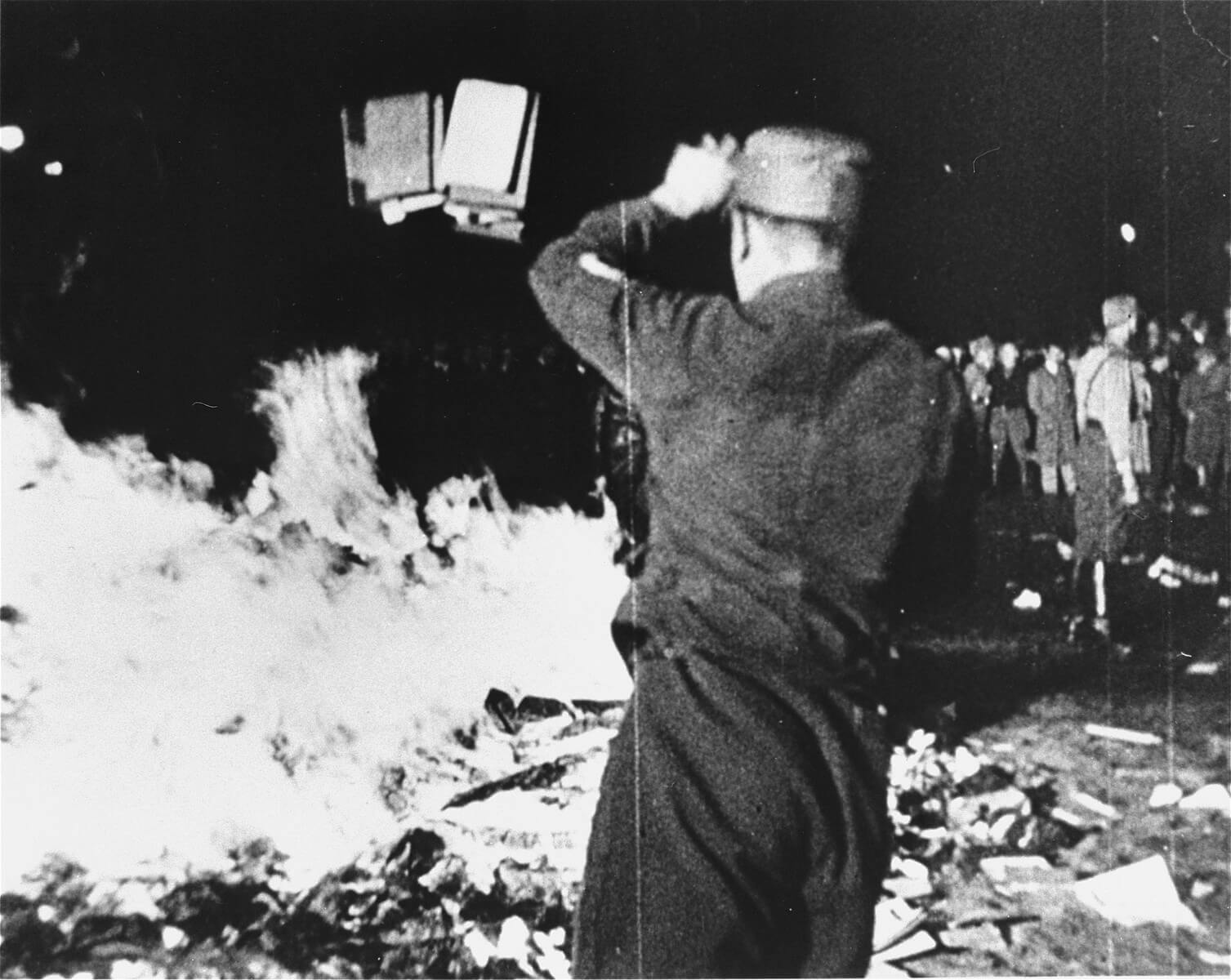
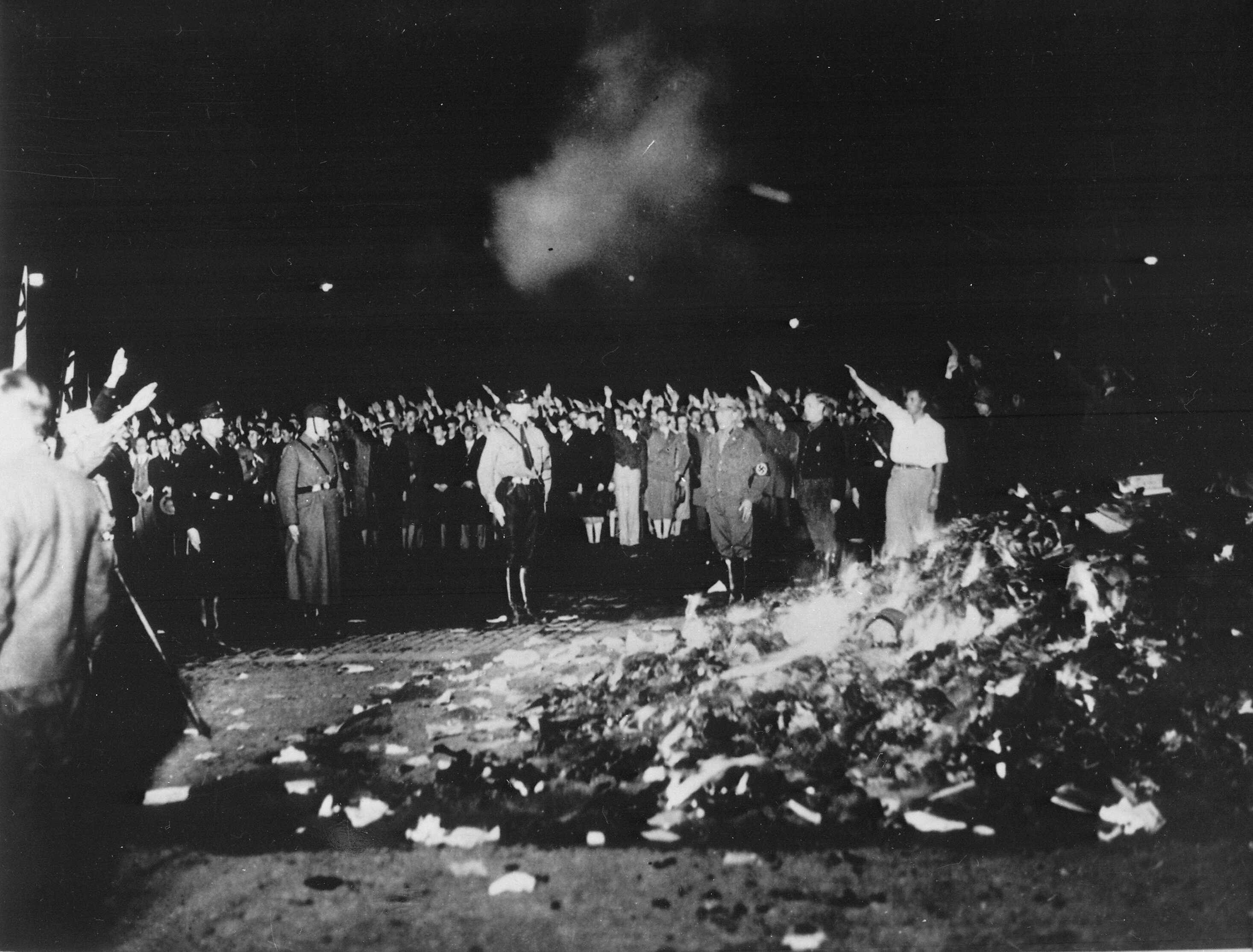
The books being burned in these images were largely from 'the Institute for Sexual Science', which was headed by Magnus Hirschfeld, a vile Jewish sodomite who attempted to spread his filth across the globe (during one such trip he picked up a Chinese catamite, whom he kept for some years before his death). Hirschfeld's 'Institute' spread homosexual, transgender, and other degenerate propaganda. No Christian in good conscience could possibly support such a wicked institution or oppose its destruction. In fact, Scripture is quite clear about the fate of such evil materials:
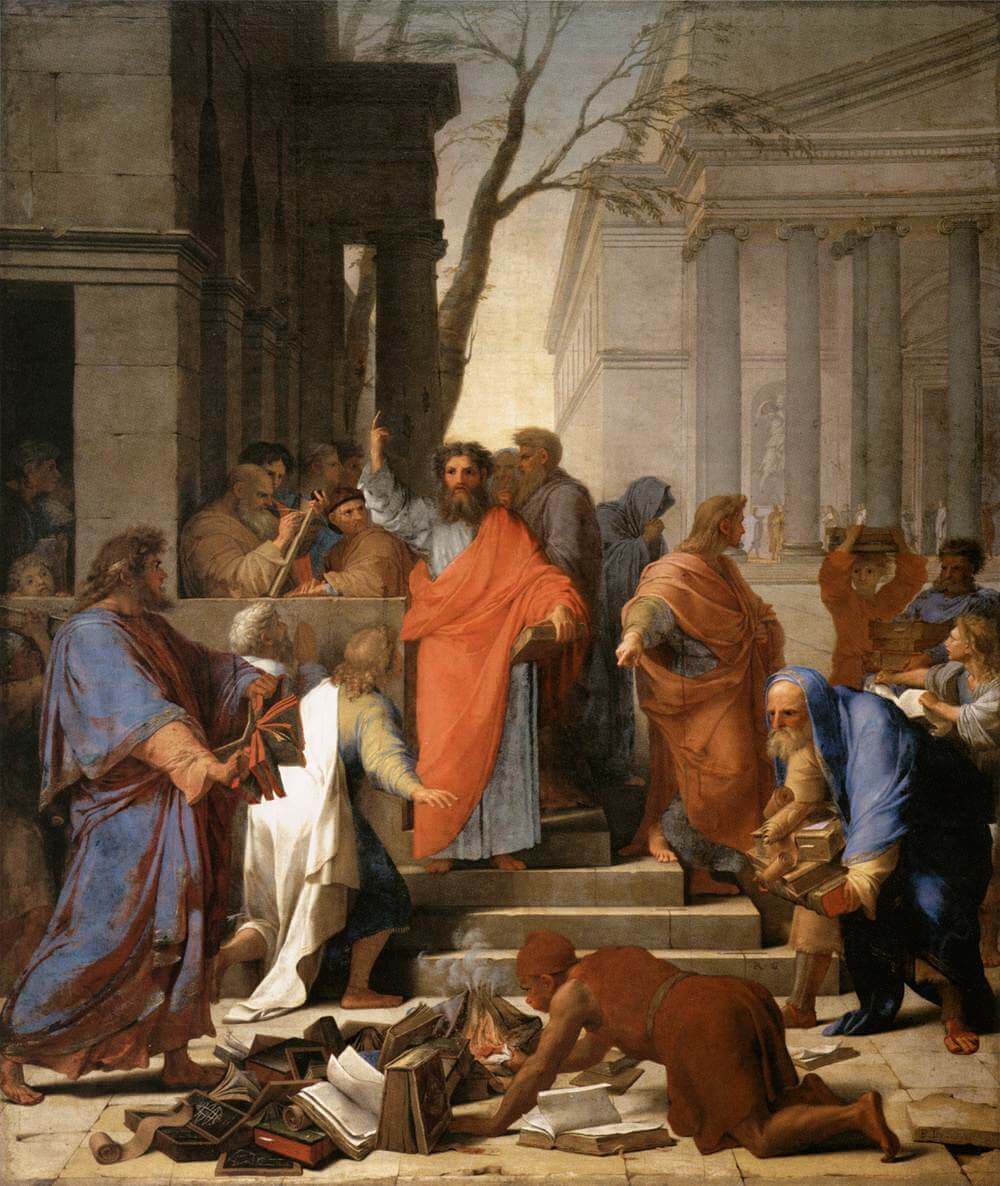
And a number of those who had practiced magic arts brought their books together and burned them in the sight of all. And they counted the value of them and found it came to fifty thousand pieces of silver. So the word of the Lord continued to increase and prevail mightily.
— Acts 19:19–20 (ESV)
It is notable that Hirschfeld's institute was the first of its kind in the world and performed the first 'gender-reassignment' ('transgender') surgery. The very sort of wickedness that we see running rampant in our own society today was running rampant in Germany in the interwar period. The NSDAP came to power and put a stop to the evil. Will we have the wherewithal to do the same?
In addition to the NSDAP opposition to (and eradication of) sexual degeneracy and exploitation, they also enacted laws against economic exploitation, including bans on usury. Today, in our own economy, there are numerous entities offering loans at rates in excess of thirty percent (e.g., credit cards), and loans as high as eighty percent have existed in our country. Historically, anything in excess of ten-percent interest has been considered per se usurious, and, for many centuries prior to that, the charging of any interest was considered a violation of Scripture's ban on usury (I happen to agree with the latter position). The Third Reich protected the poor and workers. What does Scripture say on this matter?
You shall not oppress a hired worker who is poor and needy, whether he is one of your brothers or one of the sojourners who are in your land within your towns. You shall give him his wages on the same day, before the sun sets (for he is poor and counts on it), lest he cry against you to the LORD, and you be guilty of sin.
— Deuteronomy 24:14–15 (ESV)
Concern for the poor and the needy runs through the pages of Scripture. Do we compare favorably to the Third Reich when it comes to concrete policies that aid the poor and the needy? Which policies would a Christian support?
Did Not Attack Christ's Bride, but Did Defend Her
Contrary to popular belief (born of propaganda), the Third Reich did not persecute the Church. In fact, the NSDAP enjoyed good relationships with most of the German churches, the sole exception being those churches that actively engaged in subversive activities (thereby making themselves political enemies of the German nation and, thus, legitimate targets, not churches). In fact, the NSDAP enjoyed the greatest and staunchest support amongst Evangelical (in the technical German sense) Christians, primarily Lutherans, but also Reformed, and this fact can be seen extremely clearly if one compares the census of religious affiliation in Germany (1925) and election results (1930):


The Roman Catholics did come around to support the NSDAP, which is evident in the 1932 and 1933 results:


There were approximately sixty-five million Germans in Germany in 1930, and the overwhelming majority of them supported the NSDAP. Virtually all of these Germans were Christians. In fact, Germany, under the NSDAP, was essentially the only Western nation to (at least until they lost the war) halt the collapse of Christianity:
| Year | % Christian |
|---|---|
| 1910 | 98.3% |
| 1925 | 96.5% |
| 1933 | 95.2% |
| 1939 | 94.0% |
| 1946 | 94.9% |
Germany, like all Western nations, was, during the interwar period, beginning to suffer from modernism and all the usual suspects and Christianity was in retreat. Although a mere percentage-point increase in Christianity in Germany during the reign of the Third Reich may seem minuscule, it is incredibly salient as this was achieved in the midst of dire circumstances and then an horrific war that lasted most of the time the NSDAP held actual power.
You have undoubtedly been told that the National Socialists ('Nazis') were virulently anti-Christian. Ask yourself why the national population of a country ruled by anti-Christians would become more Christian during the time of that party's rule. Perhaps the history you have learned was a bit less than accurate. For comparison's sake, the US went from approximately ninety-two percent Christian in 1900 (lower than Germany at the time) to approximately eight-four percent Christian in 1946 (also lower than Germany at the time) — a drop of eight percent, compared to Germany's drop of roughly three-and-a-half percent during roughly the same period.
For the sake of further comparison: During the Spanish 'Civil War' (read: Marxist revolution), the Marxist forces burned more than twenty thousand churches; during the Third Reich, nearly three thousand churches were built — and none was destroyed.
There is also the matter of the fact that the NS government celebrated its Christian heritage as a matter of public policy, which included celebration of the Reformation:

Condemned Paganism and Atheism
Contrary to seemingly popular modern belief, Hitler was not fond of paganism. With regard to Atheism, the position of the Third Reich should be well known (although some foolishly contend that they were Atheists). Hitler spoke directly to the matter of Atheism:
We do not tolerate anyone in our movement who violates the ideas of Christianity, who holds to some other wild-minded position, who fights against or holds himself to be an hereditary enemy of Christendom.
— Adolf Hitler, Speech at Passau (1928)
For my part, I find it curious that Hitler used the word "Erbfeind" (translated: "hereditary enemy"), because it is not a particularly common word, but does appear in the Preface to the Augsburg Confession, supra, where it is also translated 'hereditary enemy'. Naturally, this quote also condemns Judaism and paganism, not just Atheism.
There are many more quotes one could pull with regard to Atheism:
We are convinced that the people need and require this faith [Christianity]. We have therefore undertaken to fight against the Atheist movement, and that not merely with a few theoretical declarations — we have stamped it out.
— Adolf Hitler, Speech at Berlin (1942)
As Führer of the German people and Chancellor of the Reich, I can thank God at this moment that He has so wonderfully blessed us in our hard struggle for what is our right, and beg Him that we and all other nations may find the right way, so that not only the German people but all Europe may once more be granted the blessing of peace.
— Adolf Hitler, Speech before the Reichstag (1939)
He was at least equally forceful with regard to paganism:
We do not wish for a Wotan cult — it is too stupid.
The characteristic thing about [Neo-Pagans] is that they rave about old Germanic heroism, about dim prehistory, stone axes, spear and shield, but in reality are the greatest cowards that can be imagined. For the same people who brandish scholarly imitations of old German tin swords, and wear a dressed bearskin with bull's horns over their bearded heads, preach for the present nothing but struggle with spiritual weapons, and run away as fast as they can from every Communist blackjack.
— Mein Kampf (1925)
As far as this variety of ‘folkish’ warriors [Neo-Pagans], are concerned, I can only wish the National Socialist movement and the German people with all my heart: "Lord, preserve us from such friends, and then we can easily deal with our enemies."
— Mein Kampf
Attended Church, Was Baptized
Undoubtedly, this particular argument will resonate more with Lutherans (and others who rightly value Baptism): Adolf Hitler was baptized, and did attend church.
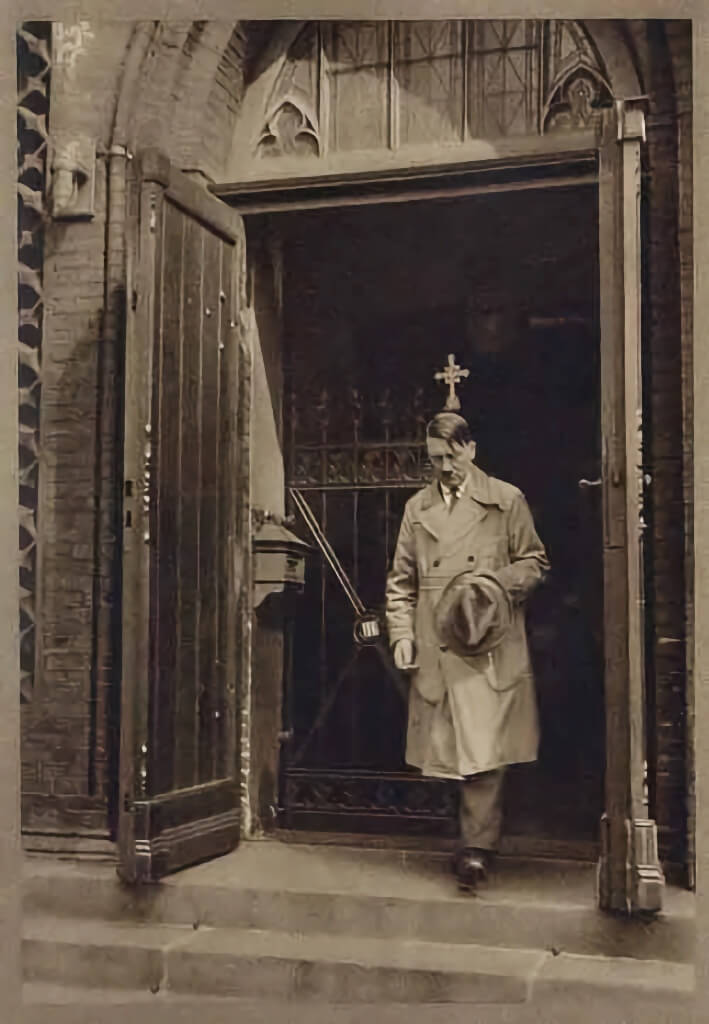
In some Lutheran cemeteries, you will find simple headstones with two words on them, sometimes in addition to a name and two dates and sometimes standing entirely alone: Baptizatus Sum. 'I am baptized.' — present tense, not past. It is our (Lutheran) contention that Baptism not only marks one as a child of God, but is rightly the departure from the kingdom of the devil and the entrance into the Kingdom of Christ. With water and the Word, we are washed clean and made new — those children who are baptized are thereby given the gift of faith (if they do not already possess it from hearing the Word). In the words of the Small Catechism:
What is Baptism?
Answer: Baptism is not simple water only, but it is the water comprehended in God’s command and connected with God’s Word.
Which is that word of God?
Answer: Christ, our Lord, says in the last chapter of Matthew: Go ye into all the world and teach all nations, baptizing them in the name of the Father, and of the Son, and of the Holy Ghost.
What does Baptism give or profit?
Answer: It works forgiveness of sins, delivers from death and the devil, and gives eternal salvation to all who believe this, as the words and promises of God declare.
Which are such words and promises of God?
Answer: Christ, our Lord, says in the last chapter of Mark: He that believeth and is baptized shall be saved; but he that believeth not shall be damned.
How can water do such great things?
Answer: It is not the water indeed that does them, but the word of God which is in and with the water, and faith, which trusts such word of God in the water. For without the word of God the water is simple water and no baptism. But with the word of God it is a baptism, that is, a gracious water of life and a washing of regeneration in the Holy Ghost, as St. Paul says, Titus, chapter three: By the washing of regeneration and renewing of the Holy Ghost, which He shed on us abundantly through Jesus Christ, our Savior, that, being justified by His grace, we should be made heirs according to the hope of eternal life. This is a faithful saying.
I do not hold the words or the promises of God lightly, and we, as Christians, are not permitted to esteem Baptism lightly. That Adolf Hitler was baptized is not irrelevant; that he attended church is not irrelevant; that he never once repudiated his Baptism or his faith is not irrelevant (more, infra). Is the blood of Christ that washes us clean through the waters of Baptism insufficient for the sins of Hitler? The Christian must answer: No. And it matters not at all how great his sins were — whether the standard narrative is true or false —, the blood of Christ remains sufficient to wash away all sins. Were his body available, Hitler could most certainly and properly be buried beneath a headstone bearing the aforementioned two words:
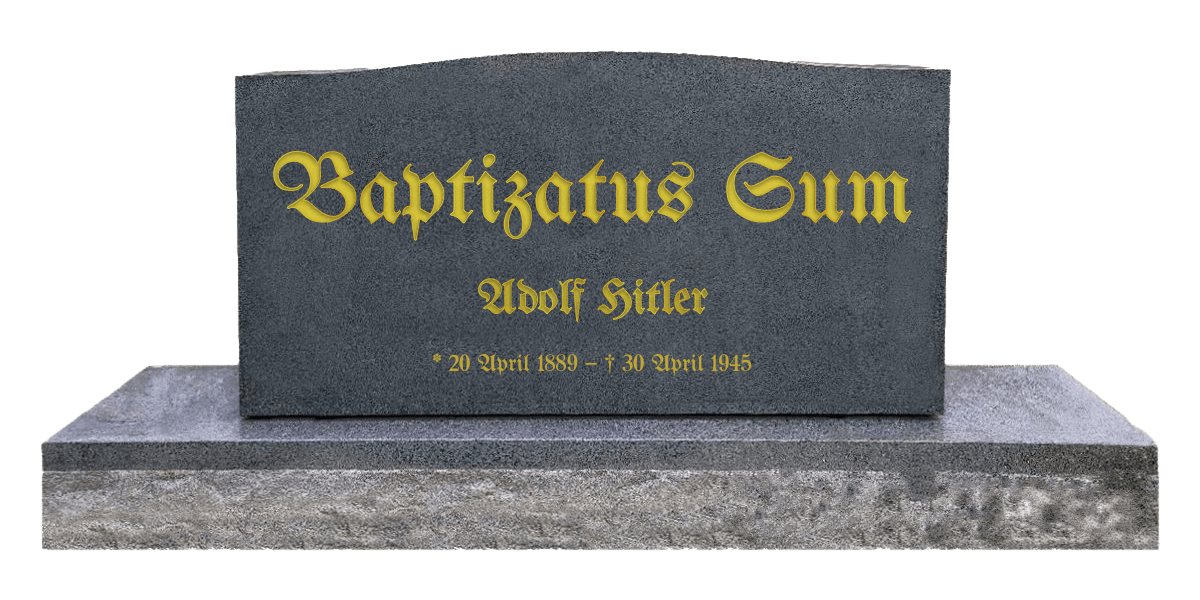
Professed Christ before Men, Never Denied Him
This is the point where I could bury you in quotes, but I will not do so here. The mere fact that I could do so should indicate to you just how often Hitler mentioned Christ and Christianity. Instead of heaping up pages of quotes, I will pull a handful of key ones, arranged by year:
The movement's goal was to translate the ideals of Christ into deeds.
— Speech at Munich (1926)
May God Almighty give our work His blessing, strengthen our purpose, and endow us with wisdom and the trust of our people, for we are fighting not for ourselves but for Germany.
— Speech at Berlin, After Hitler Was Named Chancellor (1933)
And now Staatspräsident Bolz says that Christianity and the Catholic faith are threatened by us. And to that charge I can answer: In the first place it is Christians and not international Atheists who now stand at the head of Germany. I do not merely talk of Christianity, no, I also profess that I will never ally myself with the parties which destroy Christianity. If many wish today to take threatened Christianity under their protection, where, I would ask, was Christianity for them in these fourteen years when they went arm in arm with Atheism? No, never and at no time was greater internal damage done to Christianity than in these fourteen years when a party, theoretically Christian, sat with those who denied God in one and the same Government.
— Speech at Stuttgart (1933)
The State and the People are one and the same body. The German Church and the People are practically the same body. Therefore there could be no issue between Church and State. The Church, as such, has nothing to do with political affairs. On the other hand, the State has nothing to do with the faith or inner organization of the Church.
— Interview with Charles MacFarland (1933)
Compare the immediately previous quote to the one from the speech at Munich in 1939, infra, for some additional context and emphasis.
We have experienced a miracle, something unique, something the like of which there has hardly been in the history of the world. God first allowed our people to be victorious for four and a half years, then He abased us, laid upon us a period of shamelessness, but now after a struggle of fourteen years He has permitted us to bring that period to a close. It is a miracle which has been wrought upon the German people… It shows us that the Almighty has not deserted our people, that He received it into favor at the moment when it rediscovered itself. And that our people shall never again lose itself, that must be our vow so long as we shall live and so long as the Lord gives us the strength to carry on the fight.
— Speech at Munich (1934)
In this hour I would ask of the Lord God only this: that, as in the past, so in the years to come He would give His blessing to our work and our action, to our judgement and our resolution, that He will safeguard us from all false pride and from all cowardly servility, that He may grant us to find the straight path which His Providence has ordained for the German people, and that He may ever give us the courage to do the right, never to falter, never to yield before any violence, before any danger[.] … I am convinced that men who are created by God should live in accordance with the will of the Almighty[.] … If Providence had not guided us I could often never have found these dizzy paths[.] … Thus it is that we National Socialists, too, have in the depths of our hearts our faith. We cannot do otherwise: no man can fashion world-history or the history of peoples unless upon his purpose and his powers there rests the blessings of this Providence.
— Speech at Nuremberg (1938)
We are indeed perhaps better able than other generations to realize the full meaning of those pious words "What a change by the grace of God." Amongst the accusations which are directed against Germany in the so-called 'democracies', is the charge that the National Socialist State is hostile to religion. In answer to that charge I should like to make before the German people the following solemn declaration:
- No one in Germany has in the past been persecuted because of his religious views, nor will anyone in the future be so persecuted.
- The National Socialist State since 30 January 1933 from public monies derived from taxation through the organs of the State has placed at the disposal of both Churches the following sums:
- In the fiscal year 1933, 130 million Reichsmark.
- In the fiscal year 1934, 170 million Reichsmark.
- In the fiscal year 1935, 250 million Reichsmark.
- In the fiscal year 1936, 320 million Reichsmark.
- In the fiscal year 1937, 400 million Reichsmark.
- In the fiscal year 1938, 500 million Reichsmark.
— Speech before the Reichstag (1939)
If positive Christianity means love of one's neighbor, i.e., the tending of the sick, the clothing of the poor, the feeding of the hungry, the giving of drink to those who are thirsty, then it is we who are the more positive Christians. For in these spheres the community of the people of National Socialist Germany has accomplished a prodigious work.
— Speech at Munich (1939)
I may not be a light of the church, a pulpiteer, but deep down I am a pious man, and believe that whoever fights bravely in defense of the natural laws framed by God and never capitulates will never be deserted by the Lawgiver, but will, in the end, receive the blessings of Providence.
— Speech (1944)
God the Almighty has made our nation. By defending its existence we are defending His work.
— Radio Address (1945)
I can only be released from this duty by the One Who called me to it. It was in the hands of Providence when the bomb that detonated one and a half meters away from me on July 20th failed to wipe me out and thus end my life's work. I see the fact that the Almighty protected me on that day as a confirmation of the mission given to me. In the years to come, I will therefore continue to walk this path of uncompromising representation of the interests of my people, unperturbed by every crisis and every danger, and imbued with the holy conviction that in the end the Almighty will not abandon a man who in his entire life wanted nothing more than to save his people from a fate that they never deserved.
— Radio Address (1945)
If you can read the foregoing quotes and not recognize a fellow Christian, then that is between you and God.
Before we leave this section of quotes, I would like to add two (yes, out of chronological order), because I believe they deserve especial emphasis. As is obvious, a man may change over the course of his life, particularly if he goes through some number of major life events. It is hardly debatable that Hitler went through more than his fair share of major life events, and so it is wise to look at how he may or may not have changed over time, in this case, with regard to Christianity. So, I submit to you the following two quotes; the first from his first radio address as Chancellor and the second from his last radio address to the German nation.
I trust you will notice the theme without my having to highlight it.
More than fourteen years have passed since that unfortunate day when, blinded by promises at home and abroad, the German people forgot the highest goods of our past — the Reich, its honor, and its freedom — and lost everything in the process. Since those days of betrayal, the Almighty has withdrawn His blessing from our people. Discord and hatred have taken hold. In the deepest distress, millions of the best German men and women from all walks of life see the unity of the nation fading away and dissolving into a jumble of political and egotistical opinions, economic interests, and ideological opposition.
As so often in our history, since that day of revolution, Germany has presented a heartbreaking picture of disunity. We did not receive the promised equality and brotherhood, but we did lose our freedom. The dissolution of the unified spirit and will of our people at home was followed by the decline of its political position on the world stage.
…
Thus, the national government will consider its first and foremost task to be restoring our people's unity of will and spirit. It will preserve and defend the foundations on which the strength of our nation rests. It will take Christianity as the basis of our entire morality, and staunchly defend the family as the nucleus of our national and state body. It will reawaken in our people the consciousness of their national and political unity and the duties arising from it, across all ranks and classes. It will make reverence for our great past and pride in our old traditions the basis for the education of German youth. In doing so, it will wage a merciless war against spiritual, political, and cultural nihilism. Germany must not and will not sink into anarchic Communism.
…
May Almighty God give our work His grace, lead our will on the right path, bless our insight, and grace us with the trust of our people, for we do not wish to fight for ourselves, but for Germany!
— First Radio Broadcast as Chancellor (1933)
Twelve years ago when the immortalized Reich President Paul von Hindenburg entrusted me with the chancellorship as leader of the strongest party, Germany was faced with the same situation internally as it is today externally in terms of geopolitics. The process of economic destruction and annihilation of the democratic republic, initiated and continued according to plan by the Treaty of Versailles, led to a phenomenon that was gradually becoming permanent of almost seven million unemployed, seven million part-time workers, a ruined peasantry, destroyed trade, and a corresponding breakdown of the economy. The German ports were nothing but grave shipyards. The financial situation of the Reich threatened at any moment to lead to the collapse not only of the state, but also of the provinces and municipalities. The decisive point, however, was this: Beyond this methodical economic destruction of Germany loomed the specter of Asiatic Bolshevism, then as now. And just as it is now on a large scale, on a small scale the bourgeois world was completely incapable of offering effective resistance to this development in the years before we seized power.
…
The Almighty created our nation. By defending its existence, we defend His work. The fact that this defense is linked with unspeakable misfortune, suffering, and pain beyond compare only makes us more attached to this nation. But it also gives us the hardness we need to fulfill our duty even in the worst crises[.]
…
Taken together, they amount to one thing only: to work and to fight for my people. I can only be released from this duty by the One Who called me to it. It was in the hands of Providence when the bomb that detonated one and a half meters away from me on July 20th failed to wipe me out and thus end my life's work. I see the fact that the Almighty protected me on that day as a confirmation of the mission give to me. In the years to come, I will therefore continue to walk this path of uncompromising representation of the interests of my people, unperturbed by every crisis and every danger, and imbued with the holy conviction that in the end the Almighty will not abandon a man who in his entire life wanted nothing more than to save his people from a fate that they never deserved.
In this hour, therefore, I appeal to the whole German people, but above all to my old comrades in arms, and to all soldiers, to arm themselves with an even greater, hardened spirit of resistance, until we may, as we did once before, lay a wreath on the grave of the dead of this mighty struggle with a ribbon inscribed: “And yet you triumphed nevertheless!”
I expect every German to fulfill his duty to the utmost, to make every sacrifice that is and must be demanded of him; I expect every healthy person to risk his life and limb in the struggle; I expect every sick and infirm or otherwise indisposed person to work to the utmost of his strength; I expect the inhabitants of the cities to forge the weapons for this struggle; and I expect the peasant to give bread for the soldiers and workers of this struggle with the greatest possible sacrifice. I expect women and girls to support this struggle, as they have done up to now, with the utmost fanaticism. I turn with special confidence to the German youth.
By forming such a sworn community, we can rightly go before the Almighty and ask for His mercy and blessing, for a people cannot do more than ensure that everyone who can fight, fight, and everyone who can work, works, and all sacrifice together, filled only with one thought of securing freedom, national honor, and a future for life.
— Final Radio Broadcast to the German People (1945)
Hear the Word of the Lord:
So everyone who acknowledges me before men, I also will acknowledge before my Father who is in heaven, but whoever denies me before men, I also will deny before my Father who is in heaven.
— Matthew 10:32–33 (ESV)
Conclusion
In light of the foregoing, I find that I am precluded by conscience and by the words of my Lord and Savior, Jesus Christ, from condemning a man who professed Christ before millions, who sent his armies against godless Atheists after outfitting them with belts that bore the motto "God with us", who neither closed nor attacked the churches, but defended and supported them, who praised Luther and the Reformation, who attended church and heard the Word of God preached, and who most assuredly neither sought nor found friendship with the world. If Adolf Hitler is in Hell, then assuredly there is no hope for any of us; his appeal is neither greater nor lesser than yours or mine. When he stood before the Throne, he could claim nothing but the blood of the Lord and Savior Whom he acknowledged before men and Who promised not to deny him before the Father. Hitler stood before the Judgement Seat with no works in his hands, and you and I will one day do the same. Either we are justified by the blood of Christ without works or we are justified by works — and all lost.
What is at stake when it comes to the final disposition of Hitler's soul is not actually Hitler's soul — his eternity depends not at all upon what you or I believe; what is at stake is the core of the Faith:
Justification by grace alone through faith alone for the sake of Christ's work alone.
Those who would damn Hitler do so on the basis of his (supposed or actual) works; I find that I must look not to the works of any mere man, but to the works of Him Who is both God and Man. If I contend that there are sins not covered by Christ's blood, then I deny the Atonement. If I contend that man must contribute to his salvation with his own works, then I deny the Atonement. If I contend that Christ will deny before the Father those who professed Him before men, then I call Him a liar.
I am, therefore, bound by the Word of my God, by the faith delivered once for all, and by conscience, against which it is neither wise nor safe to speak or to act, to hold that Adolf Hitler, whatever his personal merits or demerits, is in Paradise, for he was and is a baptized child of God, who professed Jesus Christ before men. In the end, he was a beggar — and so am I.
Hoc est verum.
-
Yes, of course, a man may, to some degree, be known by his enemies, but that is in the sense that those who oppose a man reveal something about him by their own nature — it does not mean that the words of a man’s enemies should be taken at face value, at least not in the absence of adequate warrant. ↩︎

